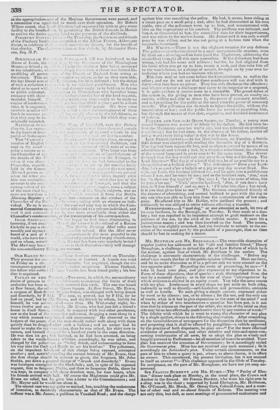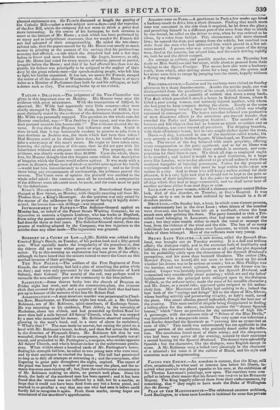Mn.. BENTHAM AND MR. BnounnAan—The venerable champion of popular justice
has addressed to his "old and familiar friend," Henry Brougham, a challenge to defend the plan of Law Reform of which he is the author, against that of which Mr. Bentham is the author. The challenge is extremely characteristic of the challenger. "Before my mind's eye stands the bar of the public opinion tribunal. Meet me there, and let us make discussion as if in a private suit we were counsel on the two opposite sides.' Regarding the mode of proceeding, he says—" I take in hand your plan, and give expression to my objections to it. Form of these objections, that of queries : each distinguished from the rest by a numeral figure; as in the case of those interrogatories' by which evidence is elicited in an equity court. You take the same course with my plan. Irrelevancy in every shape we put aside on both sides, indirectly as well as directly—self.laudation and personalities, amicable as well as hostile. To each giving a simple answer, expressed either by word or by silence: yes, or by silence ; for the use, and the only use of words, what is it but to give expression to the state of the mind ? and when by either of two interlocutors a question has been put, is it not true that by silence on the part of the other, the state of the mind on that side may be no less effectually made known than by any number of words ? " . The felicity with which he is wont to stamp the character of any plan by a single epithet, shines in the following observation. After remarking on the unsuitableness of newspapers for the discussion that he meditates, and proposing that it shall be effected by pamphlets—a vehicle approved by the practice of both disputants, he goes on—" For the more effectual avoidance of personalities, and other delusive and time-and-space-con- suming irrelevancies of all sorts, let us adopt the pima so wisely and happily pursued in Parliament—let all mention of names be avoided. Your plan has received the accession of Government ; be it accordingly styled the Government plan. Mine has not received any such accession ; be it accordingly the Individual's plan. Under certain circumstances, on the part of him to whom a query is put, silence, as above shown, is in effect an answer. This considered, the present invitation, has it not secured to itself an answer ?"—This challenge appeared in the Globe of Tuesday. Its acceptance, on the part of Mr. Brougham, we have not yet seep an- nounced.
SIR FRANCIS BURDETT AND Mn. HustE.—The "Purity of Elec- tion "dinner took place on Monday, at the usual place' the Crown and Anchor in the Strand. Sir Francis Burdett, who wore his right arm in a sling, was in the chair • supported by Lad Ebrington, Mr. Hobhouse, Mr. O'Connell, Mr. Monk, Mr. Otway Cave, Colonel Jones, and a num- ber of other real and soi-disant friends of Reform. The meeting was not only thin, but dull, as most meetings of preconcerted enthusiasm and planned excitement are. Sir Francis discussed at length the passing of the Catholic Bill—rather a stale subject now-asdays—and the rejection of the Jew Bill, which the company did not seem to think a great deal more interesting. In the course of his harangue, he took occasion to sneer at the labours of Mr. Hume ; a task which has been performed by so many and so insignificant reasoaers, that we wonder Sir Francis did not feel ashamed of their companionship. .He added the ten-times- refuted tale, that the papers moved for by Mr. Hume cost nearly as much money in printing as the amount of the savings that his pertinacious economy had effected,—a tale which the Standard had told a few days before in fewer and more forcible terms. He forgot, however, to add, that Mr. Hume had voted for every motion of reform, general or partial, brought before the House; and that if he had effected less than was de- sirable, his failure was principally to be assigned to the neglect of their duty by the great reform-men—the speech-making people, who left him to fight his battles unassisted. It has not, we assure Sir Francis, escaped the notice of all the electors of Westminster, that Mr. Hume is of more value as a Member of Parliamentsthan both he and his colleague, or half- a-dozen such as they. The meeting broke up at ten o'clock.



























 Previous page
Previous page